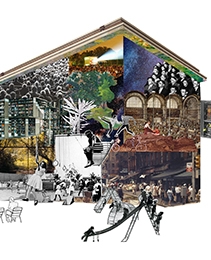Unraveling Modern Living is a site-specific installation by the Mexico City-based firm Tatiana Bilbao Estudio that transforms the former domestic space of the Madlener House to explore new forms of collectivity. Evoking the concept of the commons and rooted in storied examples of shared space—including the Greek polis, Renaissance architecture, the feminist movement, community structures, cohousing, public institutions, and appropriation architecture—the exhibition reconfigures the existing architecture to create a garden, a space for knowledge, a space for dialog, and a space for gathering.
Upon invitation to make an exhibition, Bilbao used the opportunity to experiment with making new kinds of spaces for contemporary life within existing architectural frameworks. In the case of the Madlener House, a mansion designed for a single family in 1901, the original grand conjoined living room and music room on the first floor becomes an interior garden where users can connect with nature. During the exhibition this space hosts readings, children’s story time, movement classes, and an improvisational participatory performance by artist Anna Martine Whitehead, who will be in residence in the garden for the month of December to workshop her new piece, Force.
Bilbao’s interest in activating public space through this contemporary lens stems from her belief in the basic human necessity of community and the important role that these spaces serve to foster collectivity. She envisions these critical spaces as places that nurture, serve as refuge, inspire, and aid in developing identity. In light of the increased pace of modern life, the depth and complexity of human relationships, and penchant for digital over in-person engagement— particularly in urban environments—this exhibition provides space to nurture basic human needs, grounding this experience with opportunities to connect with nature.
Looking to the natural world to facilitate the return to direct human engagement, the materiality of the exhibition underscores that the relationship with nature is fundamental, exists unconsciously, and enables communities to consciously relate to public space and each other. Here, the installation is activated, and content continues to build, as collaborative programming in the galleries embraces the inherent complexity of modern living to create spaces that support connection and encourage the creation of new relationships.
At the core of the exhibition is a modular furniture system developed in collaboration with Emmanuel Pratt and Sweet Water Foundation. The plywood cubes of the system stack and fit together like puzzle pieces to form tables and shelves or stand alone as seats. The pieces create a simple infrastructure to support groups of people gathering, sharing knowledge, and engaging in dialog. In this same vein, Tatiana Bilbao Estudio designed a new 1,000 square foot garden for the Graham that features over 45 native and regionally appropriate plant species in soil amended by Nance Klehm, punctuated by large-scale volcanic boulders and intricate brick carpets that demonstrate the design ethos of starting with local knowledge, building methods, and materials that bring influences from Mexico to Chicago. Exhibition initiatives such as the perennial garden will continue to thrive at the Madlener House beyond the life of the show. Additionally, exhibition resources, including the furniture system and book collection relating to the commons, will move to Sweet Water Foundation once the exhibition closes, continuing the community cycle.
The exhibition is the product of Tatiana Bilbao’s 2019 Graham Foundation Fellowship—a program that provides support for the development and production of original and challenging works and the opportunity to present these projects in an exhibition at the Graham’s Madlener House galleries in Chicago. The Fellowship program extends the legacy of the Foundation’s first awards, made in 1957 and 1958, and continues the tradition of support to individuals to explore innovative perspectives on spatial practices in design culture.
This exhibition is presented in partnership with the 2019 Chicago Architecture Biennial.
Tatiana Bilbao founded her Mexico City-based eponymous architecture studio in 2004. Her work analyzes site specificity and creates built environments through multidisciplinary and cross-cultural perspectives. She has taught as a visiting professor at the Yale School of Architecture, Harvard Graduate School of Design and Columbia University Graduate School of Architecture, Planning and Preservation. Bilbao’s work has been published in Architecture + Urbanism, Domus, and The New York Times, among other outlets.
Tatiana Bilbao Estudio creates work internationally at various scales, translating vernacular social codes into architecture, to develop affordable and sustainable architectural practices. Highlighted projects in Mexico include: the Culiacán Botanical Garden; the Pilgrim Route, Jalisco; and the Biotechnological Center, Sinaloa. In 2015 the studio built the Sustainable House, a social housing prototype displayed at the Chicago Architectural Biennial. The work has been recognized widely with awards such as the Berlin Art Prize and the Global Award for Sustainable Architecture.

